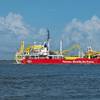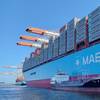At the request of U.S. partners in West and Central Africa, a Gulf of Guinea maritime safety and security conference is scheduled to be held in Cotonou, Benin, Nov. 13-15, to address improving economic, environmental, military, and governance issues in the region.
The senior-level ministers, military and civilian officials from 11 countries will meet with a goal of adopting practical, comprehensive and sustainable strategies to address maritime safety and security challenges.
The conference, sponsored by Commander, U.S. Naval Forces Europe (CNE), U.S. European Command, the Africa Center for Strategic Studies, and the Department of State, is largely the result of CNE’s work toward a safer and more secure maritime domain.
“I’m very excited about the prospect of a very positive outcome,” remarked CNE participant Rear Adm. Phil Greene, director of Navy Europe, Strategy and Policy. “I think we have reached a point where CNE, Adm. Harry Ulrich’s, vision for improving maritime safety and security in the Gulf of Guinea will bring together these countries and help them recognize, identify and confront the challenges they have in West and Central Africa.”
Organizers anticipate 90–110 participants at the three-day conference, representing Angola, Benin, Cameroon, Republic of the Congo, Democratic Republic of the Congo, Equatorial Guinea, Gabon, Ghana, Nigeria, São Tomé and Principe, and Togo.
Other participants will include selected maritime safety and security experts, high-ranking representatives from the United States, Europe, Senegal, South Africa, the African Union and regional/international organizations.
This ministerial conference follows a March 2006 conference held in Accra, Ghana. More than 80 participants from 13 African countries and representatives from five European governments, international organizations, non-governmental organizations, and petroleum and fishing organizations, along with representatives of the U.S. government attended the three-day event.
“There has been good dialogue. There has been consensus on the importance of the issues, and there is now a desire to move forward with taking the next steps and developing this framework for action they can agree upon,” Greene said. “The first step in this process is gaining a greater level of awareness about what’s going on in their maritime environment.”
Greene feels this conference is not only an important step toward achieving greater maritime safety and security in the gulf of Guinea, but it directly supports larger Navy strategic initiatives.
“I believe, from a Navy Europe perspective, we are aligned clearly with the Chief of Naval Operations’ [Adm. Mike Mullen] global maritime partnership initiative of bringing the greater neighborhood of nations together to share and understand what’s going on in the maritime domain,” he said.
Among the issues slated for discussion are smuggling, piracy, drug and human trafficking and other illegal activities, such as illegal fishing, costing countries millions annually; criminal activity which is rife throughout coastal waters; oil theft plaguing petroleum producing nations; inadequate safety that undermines trade and pollution and abuse adversely impacting the environment.
This ministerial conference will be developed in consultation with regional and subject-matter experts, as well as senior U.S. government officials, such as Assistant Secretary of State for African Affairs Ambassador Jendayi Frazer, who will deliver the keynote address.
By Mass Communication Specialist 1st Class (SW) Eric Brown, Commander, U.S. Naval Forces Europe/Commander, U.S. 6th Fleet Public Affairs
Featured videos

Tracking Foreign Vessels Working in the U.S. Jones Act Market

Inside the Electrified Truckable Tug

Inmarsat Enhances Service to Drive Digitalization
Subscribe for
Maritime Reporter E-News
Maritime Reporter E-News is the maritime industry's largest circulation and most authoritative ENews Service, delivered to your Email five times per week









